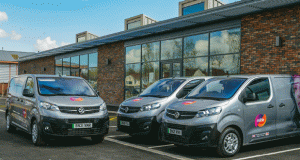The Royal Institution of Chartered Surveyors (RICS) in collaboration with IFMA have launched its latest set of Strategic FM case studies at its London HQ in November. The fifth series focuses on the societal impact of FM to demonstrate the positive contribution FM can have on the community
The first in RICS’s series of FM case studies was launched in 2014, with the aim of demonstrating the benefits of strategic FM to business and the economy. Since their inception, the case studies have focused on different areas of FM, and the latest series, once again produced by International Workplace, focuses on the societal impact of facilities management.
This is something that has risen up the agenda in recent years, said Paul Bagust, RICS’s Global Property Standards Director at the launch. He predicted: “I think going forward this is an area which offers a real opportunity for FM.”
He explained that delivering real non-financial value relating to the environmental, economic and social aspects of FM requires a disciplined approach which must be aligned closely to corporate strategy and real leadership. Facilities management, he argues, is ideally placed to deliver this value as it is ideally placed to drive significant social value. This is due to the variety of roles undertaken by FM, along with the diversity of the people working in the sector, which can translate into significant employment, training and engagement opportunities.
Helping to demonstrate the variety of ways FM can make a positive contribution to society, the case studies are drawn from a variety of sectors to illustrate the wide-ranging influence and impact that FM services have on people and communities. They describe how ISS Facility Services, Servest, Sodexo, KBR, Aviva and VINCI Facilities are:
- Integrating armed forces leavers back to work – ISS Facility Services
- Promoting personal and professional development through a Future Leader programme – Servest
- Engaging an increasingly age-diverse workforce – Sodexo
- Supporting small businesses by integrating FM service – KBR
- Making work pay (the living wage) – Aviva
- Working with stakeholders to improve the learning and employment skills of young people in east London – VINCI Facilities.
CASES IN POINT
The launch included speakers from three out of the six projects covered in the case studies. David Sharp, MD of International Workplace, took time to describe the work of the three projects not covered in detail on the night. He began with the case study from Sodexo, which demonstrates how a strategic approach to engaging an increasingly diverse workforce has helped the company to improve satisfaction rates, reduce sickness absence and retain skilled workers for longer.
Servest’s case study, he said, reveals the advantages to the FM provider of engaging with the local community in and around its Suffolk headquarters, which is helping disadvantaged young people to improve their job prospects. Finally, Aviva’s project focuses on the living wage (which was the topic of a previous RICS case study featuring KPMG) and illustrates what a great initiative the living wage is for Aviva’s FM suppliers and for the 10,000 workers in London who are being moved out of poverty in the first 10 years of the London living wage.
He added: “While those statistics are compelling for Aviva, the firm’s stated reason for adopting the living wage ¬– and I quote here from the case study – was, ‘the decision went up to board level and was justified on the basis that it was the right thing to do.’ I think that is such a lovely comment – as there is some great stuff in these case studies as to why it’s good for business, retention etc, but we all know what it’s like when we get into a boardroom and someone has to make a decision and cost it out. So this statement reflects the commitment of Aviva of it simply being ‘the right thing to do’.”
PRESENTING THE FACTS
Kicking off the three presentations from the case study participants present at the launch, Colin Kenton, MD, Facility Management Services at KBR, explained how KBR’s integrated facilities management services to the Metropolitan Police Service has not only resulted in significant savings for this most vital of public-facing institutions but benefits the SME contractors within the supply chain. This has ensured, he explained, “that local suppliers with local labour are delivering services into their local community”.
Allan Vaughan, Defence Director at ISS Facility Services, described the group’s dedication in employing ex-military personnel. He explained that ISS recognises the skills that ex-service personnel can bring, with ‘employability’ a key focus area within the business – straddling workplace and community and bringing real benefit to the business and the areas where it operates.
As a result, ISS has established close working relationships with the Recovery Career Services and the Career Transition Partnership, leading to the creation of the ISS Pathway Programme. This is designed to help service leavers transition into the civilian workforce, and to enable ISS to fully engage with the talent pool leaving the armed forces every year. Vaughan commented on the benefits to ISS of “utilising the skills of the British army, so it’s a natural direction of travel”.
The final presentation of the evening was from Rory Murphy, Commercial Director at VINCI Facilities, who described a series of learning and development programmes – spearheaded by VINCI’s Business and Community Investment Manager Josephine O’Connor – in conjunction with the Peabody Group. These projects are helping to improve literacy among young children in three London boroughs and working to improve the job prospects of students from Barking and Dagenham College.
David Sharp summarised the work of the case studies project so far. “Having completed the first one in 2014, this is the fifth edition, coming up to 30 in total. We need to respond to the challenges of delivering value, which is why people and businesses in this sector have had to change to keep on delivering value, products and services that make a difference to the world we live in, and are also commercially sustainable.
“Looking at these case studies, we’re delighted to illustrate the great work being done within the sector – and how FM teams are working in partnership with their clients and suppliers for and on behalf of their communities. That is the great spirit of these case studies.
Further information
To download the full set of case studies, visit: www.rics.org/Global/RICS_STRATEGIC_FM_Case_Studies_AUGUST_2017-06.pdf




